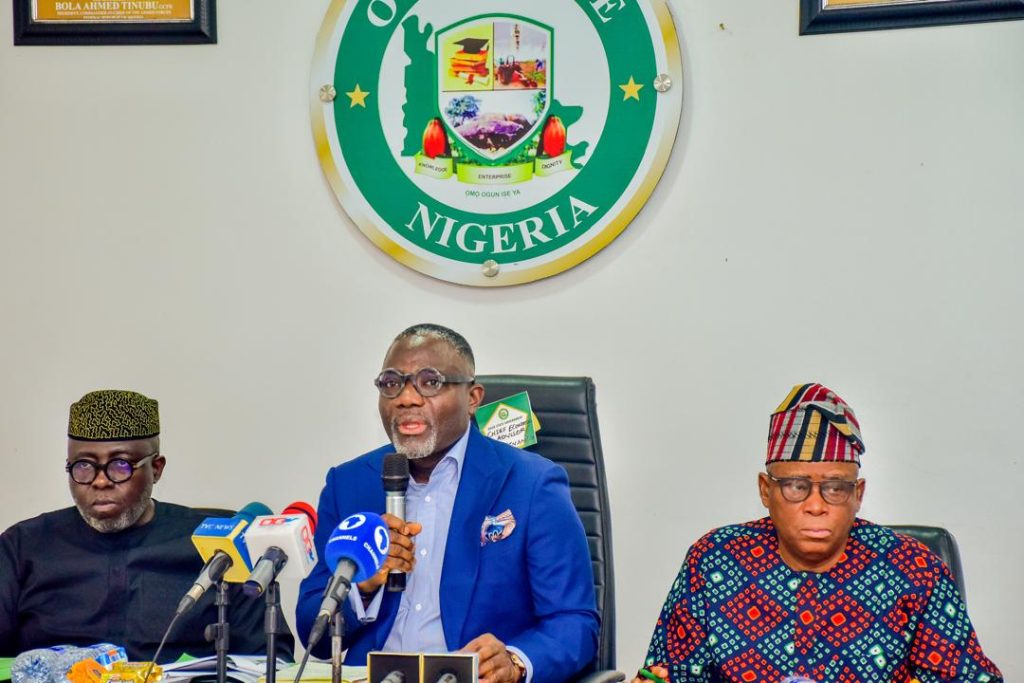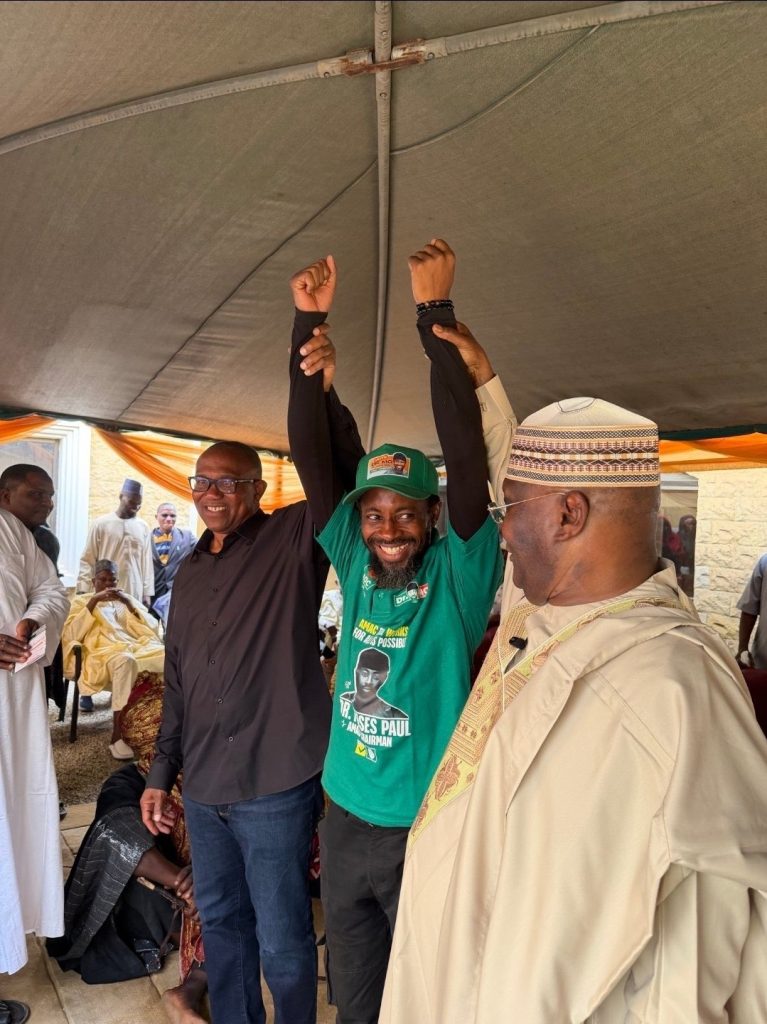Breaking News
FG Urged to Rebate Certain Individuals and Organisations from Tax Payment

The Federal Government has been urged to introduce tax rebates for individuals and organizations investing in education, healthcare, food security, and poverty eradication initiatives across the country.
The call was made by one of the leaders at Christ Embassy, Pastor Titus Temisan, during the InnerCity Mission Global Roundtable Conference on “Developing Local Humanitarian Solutions to Global Challenges” held in Lagos, as part of activities marking the World Food Day and the International Day for the Eradication of Poverty.
Temisan, who represented Pastor Chris Oyakhilome, who is the founder of the faith-based empowerment initiative, stressed that while poverty might never be completely eradicated, its impact could be drastically reduced through collective compassion and legislative incentives.
Education, according to him, remained the strongest weapon against poverty, next only to the gospel. He therefore asserted that, “If a person or organization builds a school, provides scholarships, or distributes food to thousands, such acts should attract tax rebates, just as it happens in Europe”, urging governments at all levels to use their influence and platforms to inspire others to act.
Inspired by the Mission’s work of providing free education, daily meals, uniforms, shoes, and books to indigent children, many of whom were rescued from the streets, three members of the National Assembly present at the event marvelled at the scale of investment in transforming young lives after taking a tour of the school’s facilities and food bank.
One of them, Dumnamene Dekor, member representing Khana/Gokana Federal Constituency in the House of Representatives, described the initiative as “a rare example of compassion in action,” and announced the personal commitment of his six months’ salary to support the Mission’s work.
Visibly moved, Dekor, who is Chairman, House Committee on Host Communities, decried the growing gap between government policy and actual implementation, noting that many well-conceived programmes failed to reach those who need them most.
He said “Our challenge in Nigeria is not the absence of policy but the failure of implementation. This programme should stand as a model. If even 50 percent of what is budgeted for education were properly monitored and executed, our society would be far better.”
He further revealed plans to partner with the Mission through the Host Communities Development Trusts, created under the Petroleum Industry Act (PIA), to replicate the model in local communities. “We have over 120 development trusts across host communities, and some already have up to ¦ 10 million in their base. We will work with them to redirect part of those funds toward education and humanitarian projects like this,” he said, adding that true leadership “goes beyond building roads or hospitals; it’s about touching lives, giving hope, and restoring dignity to those who have been forgotten.”
Breaking News
Ogun State Government Announces Pension, Gratuity Backlog Clearance Between 2012 and 2020

The Ogun State Government has announced the clearance of pension and gratuity arrears owed to workers who retired between 2012 and 2020, reaffirming its commitment to the welfare of retirees.
The Economic Adviser and Commissioner for Finance, Dapo Okubadejo, disclosed this on Tuesday during a media parley organised by the Ogun State Ministry of Budget and Planning.
Okubadejo explained that the backlog was linked to the Defined Benefits Scheme, under which retirees receive monthly pension payments, stressing that the present administration of Governor Dapo Abiodun has not defaulted on pension obligations since assuming office.
“Since the inception of this administration, we have not missed a single month of pension payment. What we inherited were arrears tied to the Defined Benefits Scheme,” he said.
According to him, annual pension payments rose from ₦6.7 billion in 2019 to ₦20 billion in 2025, with projections showing a possible increase to ₦40 billion by 2029.
He disclosed that the state had so far paid ₦23.3 billion in gratuities covering retirees from 2012 to 2020, alongside ₦32.8 billion in outstanding gratuities for local government retirees inherited by the administration.
Okubadejo added that between 2019 and July 2, 2025, the state disbursed ₦93.26 billion in pensions under the Defined Benefits Scheme and ₦94.78 billion to local government pensioners.
He assured that the remaining backlog would be cleared as Internally Generated Revenue (IGR) continues to improve, noting that over 300 workers who retired in July 2025 are currently receiving six-month palliatives pending the completion of their pension documentation.
The commissioner also described the newly approved Additional Pension Benefits (APB) as the first of its kind in Nigeria, adding that amendments to the state’s pension law would be pursued to formally integrate the scheme.
On the state’s fiscal outlook, Okubadejo revealed that the 2026 budget increased from ₦1.054 trillion in 2025 to ₦1.668 trillion, while Ogun’s economy expanded from ₦3.5 trillion in 2019 to ₦18.96 trillion in 2026.
He added that IGR grew from ₦50 billion in 2019 to ₦240 billion in 2025, with projections of ₦512 billion this year.
Also speaking, the Commissioner for Budget and Planning, Olaolu Olabimtan, said the 2026 budget reflects strong fiscal reforms, noting an 85 per cent budget execution rate in 2024 and sustained financial stability.
Other commissioners highlighted sectoral achievements, including massive road construction, increased healthcare funding, rail extension plans, education support programmes, and expanded housing projects across the state.
Breaking News
2027 Election: Vote for Change – Peter Obi Urges Nigerian People

African Democratic Congress, ADC, chieftain, Peter Obi, has urged Nigerians to focus on the country’s future and vote for a change in leadership.
Obi spoke at a meeting with Hausa/Fulani chiefs in Abuja on Wednesday.
“We have to talk about the future of our country. All of you know what is happening to our country today. That’s why we are campaigning that you vote out this government,” he said.
He described the situation in Nigeria as dire, citing insecurity, hunger and hardship.
“today we have insecurity across Nigeria. We have hunger across Nigeria. We are suffering across Nigeria. The only thing that is working in Nigeria today is bad news. Every morning you wake up is bad news,” Obi stated.
The former Labour Party presidential candidate said a new administration would prioritize social services.
“We’re urging you to vote for a change and bring a new Nigeria, where our children will be in school. Our hospitals will work,” he added.
Obi also questioned government spending priorities, particularly in the health sector.
“today, if you’re sick in Nigeria you’re praying to Almighty God because we’re now in a country where our president spends 360 billion to buy and refit his plane and spends 36 million in capital vote for the Ministry of Health. There’s nothing working,” he said.
He appealed to Nigerians to use their votes to usher in what he described as a “new Nigeria” focused on improving citizens’ welfare and restoring key public services.
-

 Breaking News2 months ago
Breaking News2 months agoBreaking News: Nigerian Air Force Reportedly Kills 750 Terrorists in Borno State
-

 Breaking News3 months ago
Breaking News3 months agoTerrorists Want ₦2m ‘levy’ in Katsina Community Despite Peaceful Agreement
-

 Breaking News4 months ago
Breaking News4 months agoEx-EFCC Exhibit Keeper Kaduna Zonal Directorate, Allegedly Steals ₦22m
-

 Breaking News5 months ago
Breaking News5 months agoNiger Delta Group hails Tinubu, NUPRC for ₦373bn host community fund and 536 life-changing projects
-

 News In Diaspora1 month ago
News In Diaspora1 month agoNigerian JTF Arrests Woman Supplying Drugs to Boko Haram
-

 Breaking News3 weeks ago
Breaking News3 weeks agoNew Young Players are Coming in Super Eagles – Ibrahim Gusau to Fans
-

 Business3 weeks ago
Business3 weeks agoBREAKING: No Fewer Than 28 Ships to deliver Petrol, other Commodities at Lagos Ports
-

 Breaking News3 weeks ago
Breaking News3 weeks agoEmergency: Arik Air Flight Landed at Benin Airport
